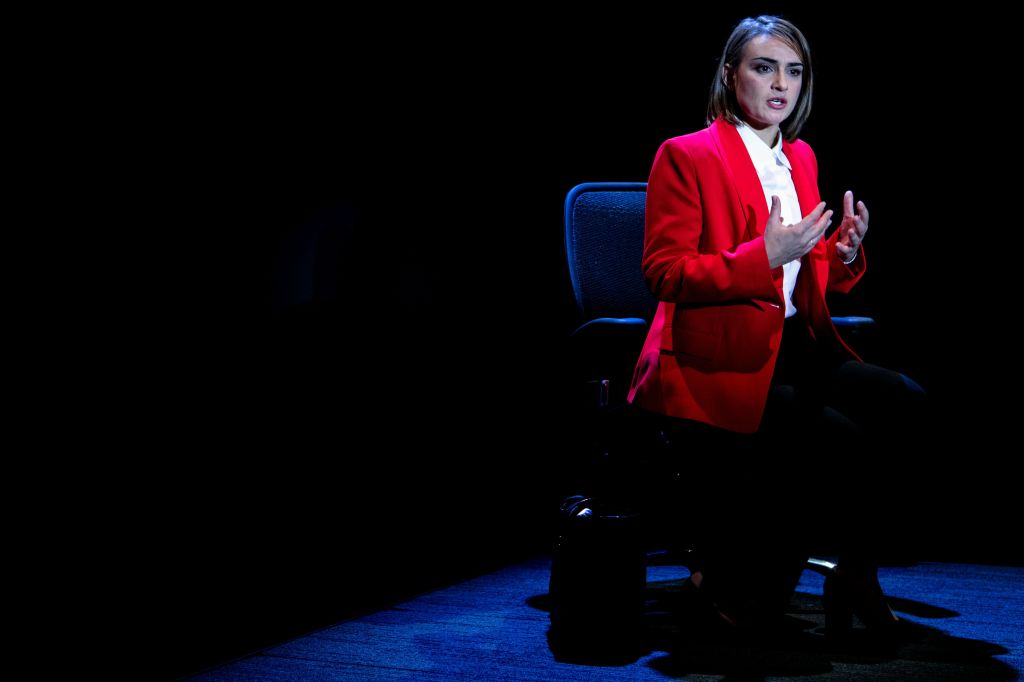Prima Facie (Queensland Theatre)
Queensland Theatre, Bille Brown Theatre
July 14 – August 7
Opening night performances often end with a standing ovation, sometimes as a slowly staggered act of obligation. In the case of the conclusion of Suzie Miller’s brilliant “Prima Facie”, however, Queensland Theatre audience members are immediately on their feet in an acclaim of thunderous applause that lasts through three curtain calls. It is an especially significant display of praise given that the riveting 100-minute tour de force indictment of the legal system is a one-woman show.
While it may be a little play in scale, “Prima Facie” is clearly about big #metoo type of ideas. What makes it ultimately gripping, however, is the storytelling skill of its performer Sheridan Harbridge, who plays 30-something Tessa, a self-described ‘bastard defence lawyer’ at the top of her game who likes to work hard and play hard. “The law is the law,” she says and as she has been taught, this is what she trusts, above even her own instincts. It’s a mantra that has abided as a key part of her successes as a criminal attorney… successes that have seen her esteemed by the promised prestige of new chambers.

The story is told entirely from Tessa’s point of view. The clearly-confident, cool-headed criminal defence barrister has worked hard to rise from working class origins to succeed in the upper class private school world of the law, which both legitimises and humanises her as a character. Her ruthless addition to the adrenaline of cross examination of witnesses is clear from the outset as she reveals in her charismatic retelling of courtroom experience of the game of law and flashes back to early law school days, with Harbridge effortlessly assuming a range of distinct characters with which to enliven each anecdote. It’s a very funny ease in what is ultimately a confronting tale in its truths, because while Tessa is initially unfaltering in her belief that the law is a tool for justice, something life-altering happens to her that betrays the beliefs at the core of her identity.
Before we realise, the story has darkened when, Tessa is sexually assaulted by a co-worker and she is forced to feel firsthand the trauma of experience within a system that fails so many women. And as Tess reports the crime and prepares for her day in court, this time as a witness, it becomes clear just how much a woman’s experience doesn’t fit the male defined world of the law. The role of Tessa is a challenging one, not just as it brings with it the load of carrying a one-woman drama of such lengthy duration. And Harbridge shows an incredible emotional range and expert control over every performance element in her share of what is a compelling character study.
Staging in appropriately simple; Renee Mulder’s set design focuses us on a lone swivel chair on a raised platform “Mastermind” style, while projections signpost the sometimes non-linear timeline. The choreography of movements around the platform adds much to audience engagement in Tessa’s tale, especially in work with Trent Suidgeest lighting design. Blue shades steel us into the trauma of Tessa’s recollections and warms things back to the present from which her retrospect is being presented, including as she is giving her testimony in court.
The play is well-constructed and effectively paced to take the audience from the humorous to the harrowing, but also in its arc of motifs and mentions. Though mostly told through Tessa’s narration of everything that is happening, even this is authentic, with occasional focus on small observational details alongside the big. Miller’s script considers language carefully meaning there is a truth to seemingly the simplest of lines, such as the heartbreak of Tessa’s emotional contemplation of how to tell her mother what has happened. They are brought to full poignant potential by Harbridge’s faultless performance as a determined woman, tormented by attempts to almost cross examine herself in question of her own memory, as much as by those employed to challenge her credibility. And when she speaks her truth outlining all she had lost, late in the show, it is an inspiring manifesto from within her damaged sense of self.
“Prima Face” is a crafted contemporary theatre work, controlled in its tonal shifts and offsets. The hard-hitting play not only scrutinises the Australian legal system, sexual consent laws and the burden of proof (and the impact of these upon victims), but forces contemplation of a system clearly defined by patriarchal values, through an engaging empathetic lens. And while it is piercing in its social commentary, it is also highly accessible for lawyers and non-lawyers alike. Indeed, Lee Lewis’ detailed direction provides spaces enough to support audience members in their own contemplations as to what is right and fair within a legal system that, although organic, is currently faulty in its failure of so many silenced women.
The critically lauded and awarded show has had a previous life; it was written in 2017 (before the #metoo movement) by former lawyer Miller, and it is unfortunate to reflect on how little has changed in this time with regards to the patriarchal justice system catching up to society’s needs. And while extended restrictions may have meant no usual opening night celebrations, we must be of course be thankful to still have the chance to access live theatre, especially when it is as exceptional as the powerful and provocative “Prima Facie”.
Photos c/o – Griffith Theatre Company






